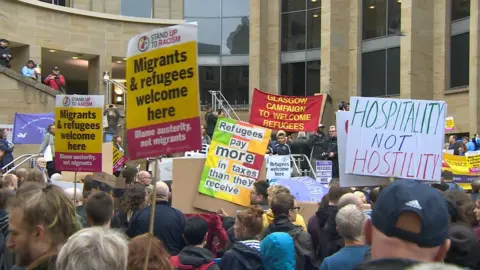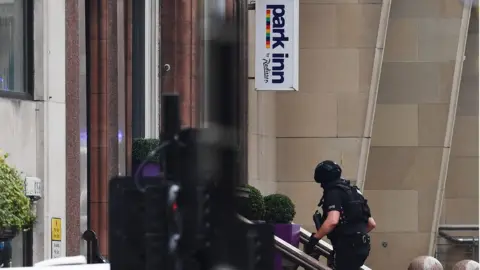Glasgow stabbings: Concerns over asylum hotel plan ahead of incident
 BBC
BBCThe mass stabbings in a Glasgow hotel have once again brought the treatment of asylum seekers into focus.
Charities and MPs have raised concerns over living conditions in city centre hotels, where asylum seekers were moved when lockdown was imposed.
On Friday, six people were injured and the suspect shot dead during the incident at the Park Inn Hotel.
Of the injured, three were asylum seekers, two were hotel staff and one was a police officer.
Why are asylum seekers in hotels?
In 2018 Glasgow was the UK local authority with the most dispersed asylum seekers, according to the House of Commons Library.
The data suggested in the year to June 2019, Glasgow took in more than 4,000.
More than 150 other UK local authorities did not house a single asylum seeker.
The Home Office currently provides free, fully-furnished accommodation to asylum seekers while applications are being considered.
It is a matter reserved to the Westminster government and in September 2019 a new provider, Mears Group, was contracted by the Home Office to provide housing and support services to asylum seekers in Scotland.
Since the lockdown was imposed many, who formerly lived in flats in the city, were moved into hotels closed because of the Covid-19 restrictions.
One was the Park Inn Hotel where the stabbings took place on Friday. Its 91 rooms held about 100 asylum seekers.
'Vulnerable' people
The Scottish Refugee Council (SRC) has expressed repeated concern about the use of hotel accommodation for people in the asylum system.
Following a briefing from Mears on Thursday, the day before the stabbings, the chief executive of SRC, Sabir Zazai said: "People were moved into hotels without formally assessing people's individual needs and vulnerabilities.
"It is unacceptable and almost certainly a breach of the asylum accommodation contract that these assessments were not conducted.
"This caused pregnant women, children, trafficking survivors and people with mental health problems to be moved to the hotels.
"Vulnerability assessments, even during a public health crisis, cannot be skipped."
After the stabbings, many of the Park Inn residents were moved to alternative accommodation in the city, but an asylum seeker charity, Positive Action in Housing (PAiH) said they had been asked to sign new leases, without the aid of an interpreter.
In a tweet the charity said: "New leases given to asylum seekers from the #ParkInnHotel #Glasgow #GlasgowStabbing last night after being moved to different hotels in #Glasgow.
"Frightened ppl, many who don't speak English were told to sign lease terms and conditions without interpreters present."
Mears referred requests for comment to the Home Office, but said it was deeply saddened and shocked by the tragic events in the heart of Glasgow.
In a statement, the Home Office said: "Throughout this pandemic, we have prioritised providing asylum seekers who would otherwise be destitute with free and safe accommodation that enables public health guidance to be followed.
"They have access to healthcare and all of their essential living needs and costs are met."
 Getty Images
Getty ImagesIn a statement on its website, Mears said: "We will provide more details as we are able to and our priority is to look after the welfare of our service users who will no doubt be traumatised by this terrible event.
"Tonight, we also think of the staff in the hotel and our colleagues at the scene - all are in our thoughts."
Mears took over the contract in Glasgow following controversy about its predecessor Serco.
Serco had embarked on a campaign of changing locks on flats occupied by asylum seekers whose leave to remain in the UK had been refused.
Court due process
Mears said while people may still be forced to leave their homes as a consequence of Home Office decisions, it pledged to follow court due process in all cases.
It had planned to move all those in hotel accommodation back into flats by the end of June.
The MP for Glasgow Central, Alison Thewliss said questions must be asked about the way asylum seekers were being housed in the city.
She told the BBC: "In general, there has been a lot of concern raised by myself and my colleagues about the conditions people have been living in in these city centre hotels.
"The accommodation provider moved asylum seekers from the flats they were living in around the city and brought them all into hotels in the city centre at the start of lockdown.
"So people have now been living in these hotels for several months, and those who were already quite vulnerable have been finding that quite difficult."
